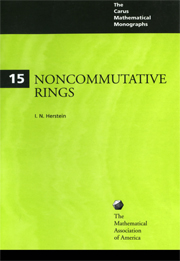5 - REPRESENTATIONS OF FINITE GROUPS
Summary
In Maschke's theorem (Theorem 1.4.1) we showed that the group algebra F(G) of a finite group G of order o(G) over a field F of characteristic 0 or p where p∤o(G) is semi-simple. By the theorems we have already proved about the nature of semi-simple Artinian rings the structure of F(G) is fairly decisively pinned down. The information we garner this way about F(G) allows us to probe more deeply in G itself. It is this interplay between G and F(G) and its consequences that we propose to study in this chapter. We shall assume throughout—unless otherwise stated—that F is the field of complex numbers. Most of what we do could be done for any algebraically closed field of characteristic 0 or p where p∤o(G).
The elements of the theory. Cayley's theorem in the theory of finite groups asserts that every finite group is isomorphic to a group of permutations; these permutations in turn have a very nice representation as matrices whose entries are O's and l's. Nice as this realization of the group as a group of matrices is there are many nicer and more important ways of representing the group—homomorphically now instead of isomorphically—as a group of matrices.
We begin with the
Definition. A representation of G is a homomorphism ψ of G into L(V), the algebra of linear transformations on V over F, such that ψ(1) = I the identity transformation.
Information
- Type
- Chapter
- Information
- Noncommutative Rings , pp. 124 - 149Publisher: Mathematical Association of AmericaPrint publication year: 1968
